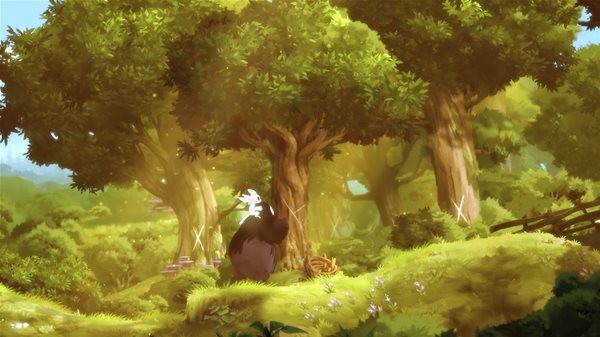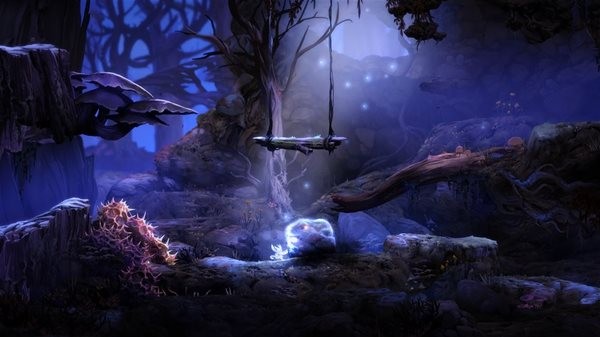Also On: PC
Publisher: Microsoft Studios
Developer: Moon Studios
Medium: Digital
Players: 1
Online: No
ESRB: E
Just going by gameplay, I don’t think there’s anything especially noteworthy about Ori and the Blind Forest. I mean, don’t get me wrong: it’s a solid platformer, and it deserves some measure of praise for that. The controls are pretty easy to use, everything moves at just the right speed, and there’s an impressively large map to explore. But at the same time, the save system is kind of terrible, in that placing a save point in the wrong spot can essentially screw up your whole game and force you to start over. While it’s certainly better than a lot of other platformers, I’m not sure that I’d pick playing this over, say, either of the recent Rayman games, or Trine, or Little Big Planet. In other words, it’s good, but it’s pretty far from great.
But that’s just going by gameplay. Expand your field of vision a little further, and suddenly Ori looks a whole lot better. This is apparent right from the get-go, when the game starts off with a slow-moving sorta-cutscene in which — and hopefully this isn’t spoiling anything, since it happens within minutes of turning on the game, but just in case it is: SPOILER ALERT — the main character’s parental figure dies a slow, agonizing death, followed by the main character more or less following suit. It should tell you something about the quality of these wordless moments, in which you have limited ability to control the characters’ movements, that it’s pretty much impossible to not get sucked in when it all falls apart. If that doesn’t scream “exceptional writing!”, I don’t know what would.
Even more impressively, the game proves itself to be more than up to the task of sustaining that emotional weight throughout the game. It knows when to let you explore, and when to slow things down with a voiceover in its strange, mournful language. It feels odd to rave about the writing when there’s so little of it on display, but time and again, Ori and the Blind Forest shows that it knows how to make very little go a very long way.
Of course, this minimal approach to story is carried, in large part, by a look and feel that fills in a lot of the gaps. Ori’s world is a delight to look at, a gorgeous marvel that simultaneously looks lush and natural, but also otherworldly. It’s the story of a lost soul journeying through a spirit world full of dangers, and the game does a phenomenal job of conveying both the beauty and the peril with designs and colours that capture both sides of that perfectly. Likewise, while the music isn’t quite as rave-worthy, it’s still a major part of creating an immersive experience.
It’s just unfortunate, then, that such near-perfect visuals and story and sound aren’t matched up by equally perfect gameplay. Ori and the Blind Forest is still enjoyable, obviously…it’s just that those strengths are so strong that it’s hard to imagine what would’ve been needed for that one ever-so-slightly-weaker element to match up with them. Nonetheless, it’s still one heck of an accomplishment, and it’s well worth your investment.



